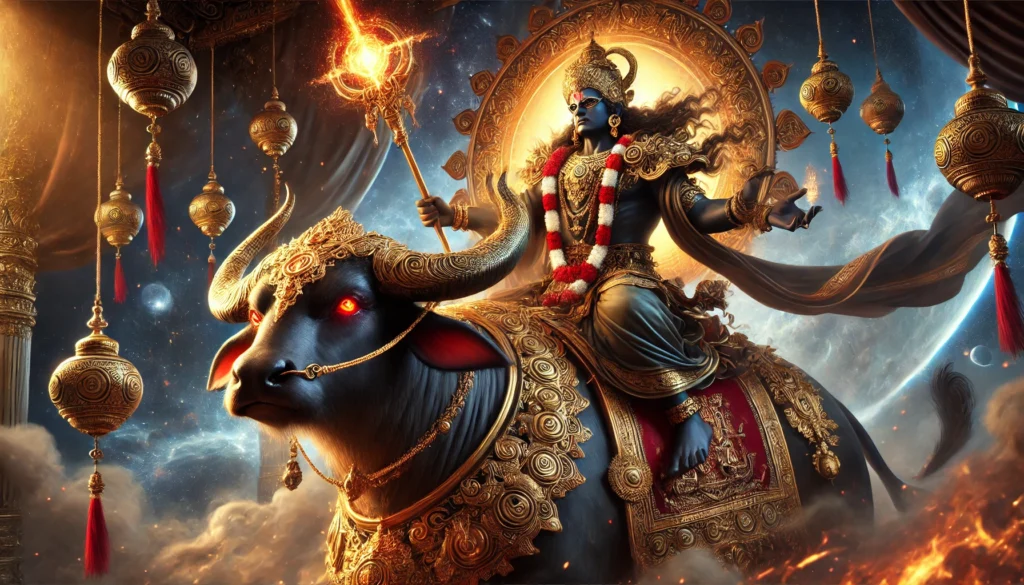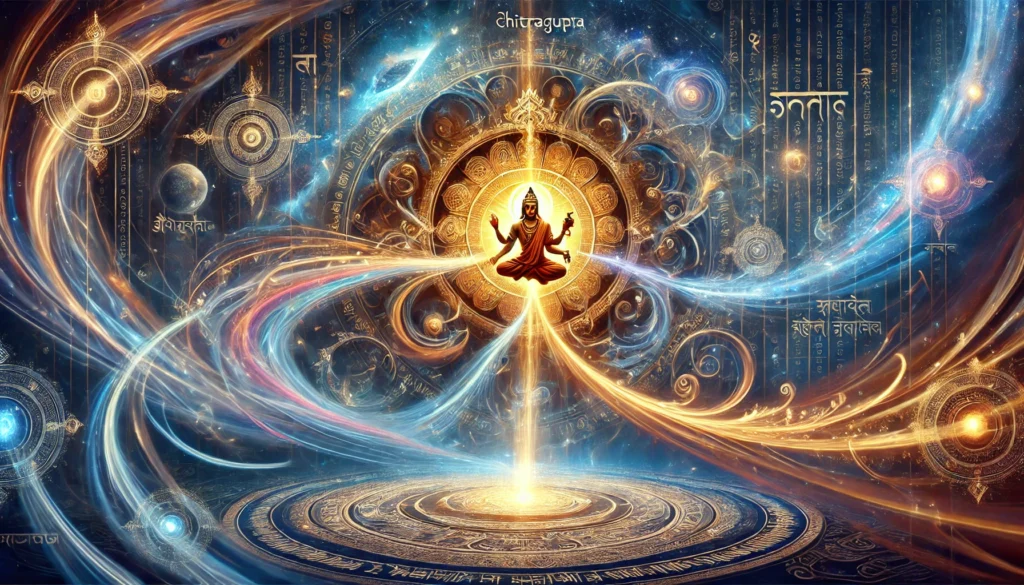Table of Contents
- Introduction: The Eternal Accountant of Karma
- Who Is Chitragupta? The Divine Scribe of Cosmic Justice
- The Birth of Chitragupta: A Celestial Creation
- Chitragupta’s Relationship with Yama: The Administrator of Justice
- Karmic Balance in Hinduism: A Deeper Look
- Chitragupta in Hindu Scriptures: Unraveling Ancient Wisdom
- The Mystical Role of Chitragupta in Life’s Final Balance Sheet
- Modern Parallels: Accountability in Today’s World
- Chitragupta’s Relevance in Modern Spiritual Practices
- Lessons from Chitragupta’s Balance Sheet for Daily Life
- Shlokas and Teachings: The Spiritual Essence of Karma
- FAQs: Common Questions About Chitragupta and Karma
- Conclusion: The Eternal Keeper of Balance
Introduction: The Eternal Accountant of Karma
Imagine an eternal ledger where every action, thought, and intention is meticulously recorded. This isn’t just a metaphor but a cornerstone of Hindu philosophy, where Chitragupta, the divine accountant of karma, ensures that every soul faces the consequences of its deeds. As the Guardian of Karma, Chitragupta’s role is both mystical and profound, bridging the gap between our mortal lives and cosmic justice.
But who is this divine scribe? How does he maintain this celestial record? Let’s dive into the enigmatic world of Chitragupta and unveil the secrets behind life’s final balance sheet.

Who Is Chitragupta? The Divine Scribe of Cosmic Justice
In Hindu mythology, Chitragupta is revered as the divine accountant, tasked with maintaining detailed records of every individual’s actions. Upon death, souls face Yama, the God of Death, but it is Chitragupta who presents the karmic ledger that determines the soul’s fate—heaven, hell, or rebirth.
Key Attributes of Chitragupta:
- Divine Role: Keeper of karmic records.
- Appearance: Often depicted with a pen and ledger, symbolizing his role as the celestial scribe.
- Companion to Yama: Works alongside Yama to ensure spiritual accountability.
In essence, Chitragupta embodies the idea that every action has consequences, reinforcing the Hindu philosophy of karma and dharma.
The Birth of Chitragupta: A Celestial Creation
The origins of Chitragupta are as mystical as his role. According to the Puranas, he was created by Lord Brahma from his mind and soul to maintain order in the universe. His name, “Chitragupta,” means “hidden picture,” symbolizing his ability to perceive and record the deepest truths of human actions.
Mythological Account:
In the Garuda Purana, it is said:
“Chitraguptaḥ samutpannaḥ sādhu-kṛtyasya pālakaḥ,
Paśyati pāpānāṁ karmaṇāṁ cha gūḍhānāṁ niyamakaḥ.”
(Chitragupta, the upholder of righteousness, records both visible and hidden actions with divine precision.)
This celestial birth underscores his impartial and divine nature, emphasizing the idea that no action escapes cosmic accountability.

Chitragupta’s Relationship with Yama: The Administrator of Justice
Chitragupta and Yama form a formidable team in the Hindu afterlife. While Yama governs the realm of death, it is Chitragupta who ensures karmic justice by presenting the ledger of deeds.
Roles in the Afterlife:
- Yama: Decides the path of the soul based on Chitragupta’s records.
- Chitragupta: Maintains impartiality, ensuring every action—good or bad—is accounted for.
This partnership reflects the duality of life and death, justice and consequence, making them the ultimate Guardians of Karma.
Karmic Balance in Hinduism: A Deeper Look
The concept of karma is central to Hindu philosophy. It is the cosmic law of cause and effect, where actions dictate the destiny of the soul. Chitragupta’s role amplifies this by acting as the eternal witness to our deeds.
Key Teachings on Karma:
- Sanchita Karma: Accumulated karma from past lives.
- Prarabdha Karma: Karma currently being experienced.
- Agami Karma: Future karma based on present actions.
Chitragupta ensures that these karmic cycles are meticulously balanced, reinforcing the spiritual principle of accountability.
Chitragupta in Hindu Scriptures: Unraveling Ancient Wisdom
Chitragupta’s significance is deeply rooted in Hindu scriptures like the Vedas, Upanishads, and Puranas. His role as the divine accountant is a recurring theme, emphasizing the moral and ethical framework of Hinduism.
Notable References:
- Garuda Purana: Details his role in the afterlife and karmic justice.
- Mahabharata: Alludes to the concept of divine record-keeping.
- Yajnavalkya Smriti: Highlights the importance of dharma and Chitragupta’s role in enforcing it.
These texts paint a vivid picture of Chitragupta’s duties, offering timeless lessons on the cosmic justice system.
The Mystical Role of Chitragupta in Life’s Final Balance Sheet

As the divine accountant of karma, Chitragupta’s task is to present a comprehensive report of an individual’s life. This report, or balance sheet, is not just a tally of good and bad deeds but a profound reflection of one’s spiritual journey.
The Final Balance Sheet:
- Credits: Acts of kindness, charity, and righteousness.
- Debits: Sins, misdeeds, and moral failings.
- Net Worth: Determines the soul’s progression or regression.
This concept serves as a spiritual reminder that every action, no matter how small, contributes to our eternal balance.
Modern Parallels: Accountability in Today’s World
In a world driven by data and transparency, Chitragupta’s role offers a timeless analogy. Just as we are held accountable in professional and personal spheres, the divine accountability system reminds us of the spiritual repercussions of our actions.
Examples:
- Corporate Ethics: Transparency in business aligns with the karmic principle of accountability.
- Personal Growth: Self-reflection and mindfulness resonate with the idea of maintaining one’s spiritual ledger.
These parallels make Chitragupta’s teachings relevant in today’s ethical and moral landscape.
Chitragupta’s Relevance in Modern Spiritual Practices
Even in contemporary spiritual discourse, Chitragupta’s role finds relevance. Practices like meditation, journaling, and ethical living mirror his principles of record-keeping and self-awareness.
Modern Practices Inspired by Chitragupta:
- Daily Reflection: Journaling thoughts and actions to align with dharma.
- Meditation on Karma: Understanding the impact of our deeds on our spiritual journey.
- Ethical Living: Making conscious decisions to ensure positive karmic outcomes.
These practices foster self-discipline and spiritual growth, akin to Chitragupta’s teachings.
Lessons from Chitragupta’s Balance Sheet for Daily Life
The idea of a karmic balance sheet can be applied to daily life. By maintaining awareness of our actions, we can strive for a more ethical and fulfilling existence.

Practical Applications:
- Kindness as Credit: Small acts of kindness accumulate positive karma.
- Avoiding Debits: Being mindful of harmful actions and their consequences.
- Continuous Improvement: Regular self-assessment to align with dharma.
Chitragupta’s lessons inspire us to live with integrity and purpose.
Shlokas and Teachings: The Spiritual Essence of Karma
Chitragupta’s role is often celebrated in Sanskrit shlokas that encapsulate the essence of karma and dharma. Here’s one such verse:
“Karmaṇye vadhikaraste, mā phaleṣhu kadāchana,
Mā karmaphalaheturbhūh, mā te saṁgo’stvakarmaṇi.”
(You have the right to perform your duties, but not to the fruits thereof. Let not the fruits of action be your motive, nor let your attachment be to inaction.)
This shloka reflects the core of Chitragupta’s teachings: focus on righteous action without attachment to results.
FAQs: Common Questions About Chitragupta and Karma
1. What is Chitragupta’s role in the afterlife?
Chitragupta records the actions of every individual and presents the karmic ledger to Yama, who decides the soul’s fate.
2. Is Chitragupta worshipped in Hinduism?
Yes, particularly during Chitragupta Puja, observed after Diwali by specific communities.
3. How does Chitragupta maintain karmic records?
Through divine omniscience, he perceives and records both visible and hidden actions.
4. What lessons can we learn from Chitragupta’s mythology?
Accountability, mindfulness, and the importance of ethical living.
Conclusion: The Eternal Keeper of Balance
Chitragupta’s role transcends mythology, offering profound insights into the cosmic order of karma. As the Guardian of Karma, he embodies the principles of justice, accountability, and spiritual growth, reminding us that every action shapes our eternal journey.
So, what will your karmic balance sheet reflect? Share your thoughts, questions, and reflections in the comments below. Let’s unravel the mysteries of karma together! 🌟

This site definitely has all the info I needed concerning this subject and didn’t know who to ask.
Thank you so much for your kind words! 😊 We’re delighted to hear that our article provided the insights you were looking for. Chitragupta’s role in balancing karma is truly fascinating, and there’s so much wisdom hidden in ancient scriptures. If you ever have any questions or topics you’d like us to explore further, feel free to ask—we’d love to dive deeper into Vedic mysteries with you! 🙏✨